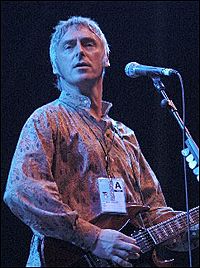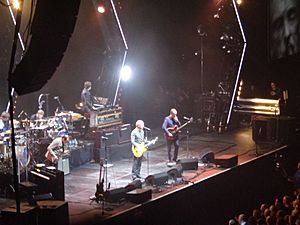Paul Weller facts for kids
Quick facts for kids
Paul Weller
|
|
|---|---|
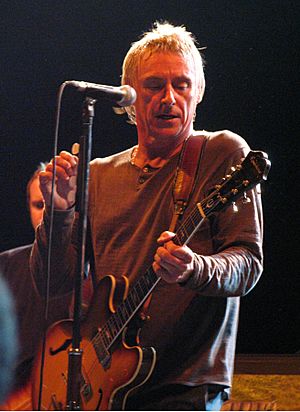
Weller performing at the Cactus Festival, Bruges, Belgium, 2009
|
|
| Background information | |
| Birth name | John William Weller |
| Born | 25 May 1958 Woking, England |
| Genres |
|
| Occupation(s) |
|
| Instruments |
|
| Years active | 1972–present |
John William Weller (born 25 May 1958), known professionally as Paul Weller, is an English singer, songwriter, and musician. He first became famous in the late 1970s as the leader of the rock band the Jam. The band was very successful in the United Kingdom and was a key part of the mod revival movement.
After The Jam broke up in 1982, Weller formed a new group called the Style Council with musician Mick Talbot. This band explored many different music styles, like pop, jazz, and soul. In the early 1990s, Weller started a successful solo career.
Weller is very popular in his home country of England. His songs often tell stories about English life. He is known as the Modfather because he was a major figure in the mod scene. He has influenced many British bands, including Oasis. Weller has won four Brit Awards, including one for his Outstanding Contribution to Music.
Contents
Early Life and First Band
Paul Weller was born on 25 May 1958, in Woking, England. His father, John, was a taxi driver and builder, and his mother, Ann, was a cleaner. He loved music from a young age, listening to bands like the Beatles, the Who, and the Small Faces. He started playing the guitar when he was eleven.
After seeing the band Status Quo in concert in 1972, he knew he wanted to be a musician. He formed a band with his school friends, which would later become The Jam. At first, they played at their school and local youth clubs. Weller's father became their manager and helped them get shows.
In 1974, Weller became interested in the 1960s mod subculture. He started riding a scooter and dressing in mohair suits, just like his musical heroes. This mod style became a big part of his image and music.
The Jam (1976–1982)
The Jam became popular around the same time as punk rock bands like the Clash and the Sex Pistols. The Jam's first single, "In the City", entered the UK Top 40 chart in 1977.
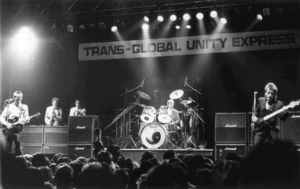
The band's popularity grew quickly. Their song "Going Underground" became a number one hit in March 1980. They were so popular that they became the first band since The Beatles to perform two songs from the same single on the TV show Top of the Pops.
Even though the band was very successful, Weller decided to end The Jam in 1982. He wanted to explore new kinds of music. The other band members, Bruce Foxton and Rick Buckler, were surprised by his decision. The Jam's final single, "Beat Surrender", went straight to number one. They played their last concert in Brighton on 11 December 1982.
The Style Council (1983–1989)
In 1983, Weller started a new group called the Style Council with keyboard player Mick Talbot. They were later joined by drummer Steve White and singer Dee C. Lee, who Weller later married.
The Style Council allowed Weller to experiment with different musical styles, including jazz, soul, and even house music. The band had several hit singles in the UK. Their songs "My Ever Changing Moods" and "You're the Best Thing" were also popular in the United States.
In 1984, Weller helped organize a charity record called "Soul Deep" to raise money for striking miners. The Style Council also performed at the famous Live Aid concert in 1985. By the end of the 1980s, the band's popularity had faded, and they broke up in 1989.
Solo Career (1990–present)
A New Beginning
After The Style Council ended, Weller took some time off. He returned to touring in late 1990 and released his first solo album, Paul Weller, in 1992. It was a success and showed that he was still a popular artist.
His next albums, Wild Wood (1993) and Stanley Road (1995), were even more successful. Stanley Road, named after the street where he grew up, became the best-selling album of his career. During this time, he became associated with the Britpop music scene. He even played guitar on the hit song "Champagne Supernova" by Oasis.
The Modfather
Weller continued to release popular albums throughout the late 1990s and 2000s. His album Heavy Soul (1997) had a more stripped-down, rock sound. In 2002, his album Illumination went to number one in the UK charts.
In 2006, Weller received the Outstanding Contribution to Music Award at the Brit Awards. He accepted the award in person and performed some of his classic songs. He also released a successful live album called Catch-Flame!.
Recent Success
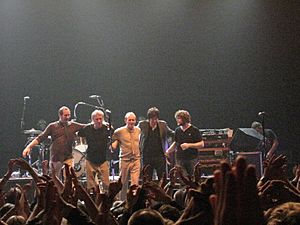
Weller's 2008 album, 22 Dreams, was more experimental. It included a wide range of musical styles, from jazz to folk. In 2009, he won the Brit Award for British Male Solo Artist.
His 2010 album, Wake Up the Nation, featured a surprise collaboration with his old bandmate from The Jam, Bruce Foxton. In May 2010, Weller received the Ivor Novello Lifetime Achievement award for his songwriting.
Weller has continued to release new music and tour regularly. His albums Sonik Kicks (2012), On Sunset (2020), and Fat Pop (Volume 1) (2021) all reached number one in the UK. This made him one of the few artists to have a number-one album in five different decades.
In 2024, he released the album 66, which featured collaborations with artists like Noel Gallagher and Suggs from the band Madness. He also made his first appearance in a movie, a historical drama called Blitz.
Personal Life
Weller was married to singer Dee C. Lee from 1987 to 1998, and they have two children. He has other children from different relationships. In 2010, he married Hannah Andrews, who was a backing singer in his band. They have three children together.
His father, John Weller, was his manager for many years, from the early days of The Jam until he passed away in 2009.
Political Views
Weller has often been involved in social and political causes. In the 1980s, he was a strong supporter of the Campaign for Nuclear Disarmament (CND). He also helped form Red Wedge, a group of musicians who supported left-wing ideas.
When former Prime Minister David Cameron said The Jam's song "The Eton Rifles" was one of his favorites, Weller was not happy. He said the song was meant to be a protest, not a "jolly drinking song."
In recent years, Weller has spoken out about world events. He has performed at concerts to raise money for people in need, such as a fundraiser for Gaza.
Discography
Studio albums
- Paul Weller (1992)
- Wild Wood (1993)
- Stanley Road (1995)
- Heavy Soul (1997)
- Heliocentric (2000)
- Illumination (2002)
- Studio 150 (2004)
- As Is Now (2005)
- 22 Dreams (2008)
- Wake Up the Nation (2010)
- Sonik Kicks (2012)
- Saturns Pattern (2015)
- A Kind Revolution (2017)
- True Meanings (2018)
- On Sunset (2020)
- Fat Pop (Volume 1) (2021)
- 66 (2024)
- Find El Dorado (2025)
See also
 In Spanish: Paul Weller para niños
In Spanish: Paul Weller para niños
 | William L. Dawson |
 | W. E. B. Du Bois |
 | Harry Belafonte |


